BMP3003 Business Management: Academic Integrity & Project 2 Reflection
VerifiedAdded on 2023/06/18
|9
|2570
|321
Report
AI Summary
This report delves into the critical aspects of academic integrity within higher education, highlighting its importance and the serious implications of academic misconduct, including social, intellectual property, assessment, and legal consequences. It further reflects on the creation of a game project, utilizing Gibbs' reflective cycle to analyze the steps taken, difficulties encountered, and skills learned throughout the process, such as thinking, communication, and technological skills. The report emphasizes the significance of academic integrity in fostering a fair and responsible academic environment and concludes with insights gained from the project development experience.
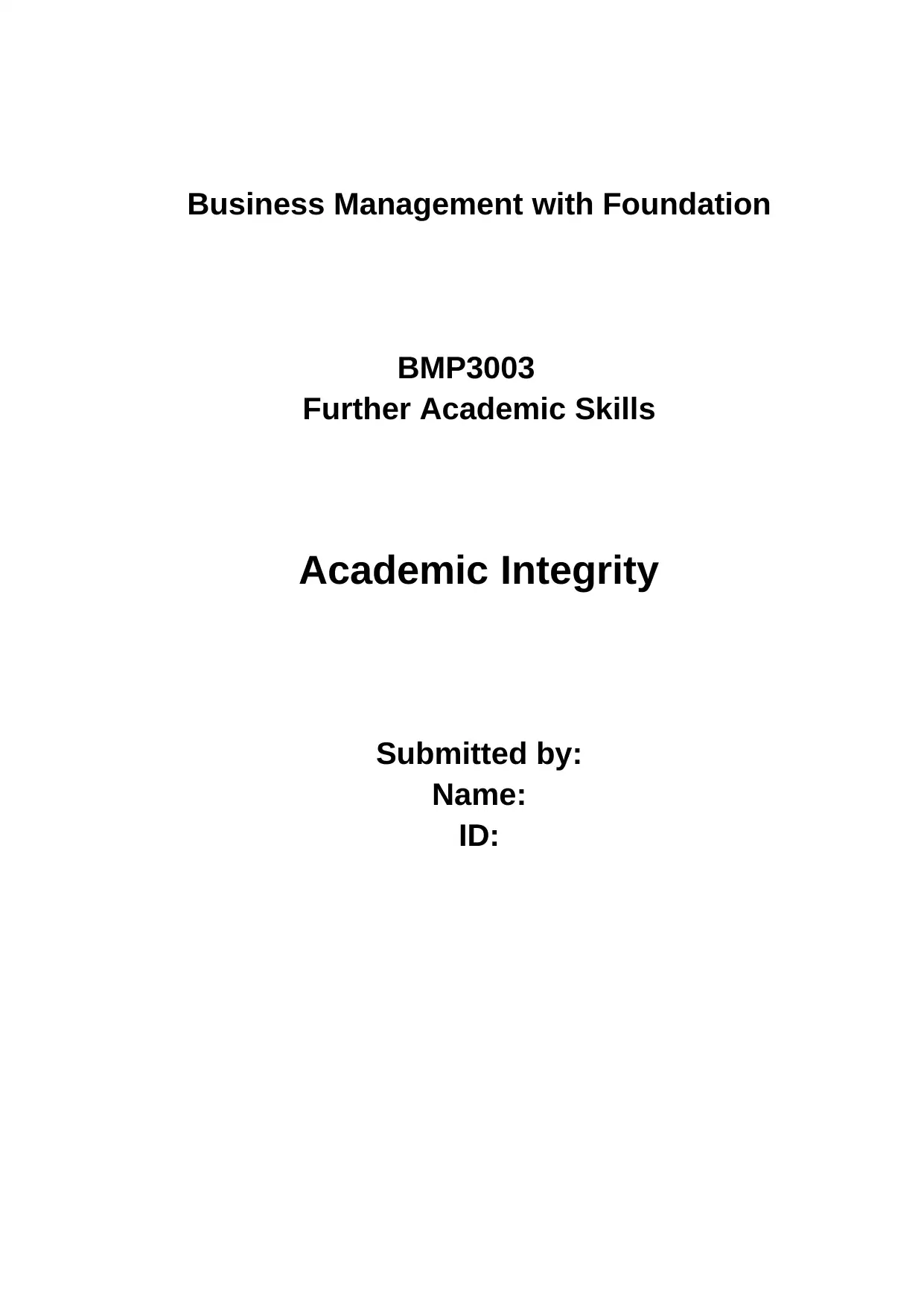
Business Management with Foundation
BMP3003
Further Academic Skills
Academic Integrity
Submitted by:
Name:
ID:
BMP3003
Further Academic Skills
Academic Integrity
Submitted by:
Name:
ID:
Paraphrase This Document
Need a fresh take? Get an instant paraphrase of this document with our AI Paraphraser
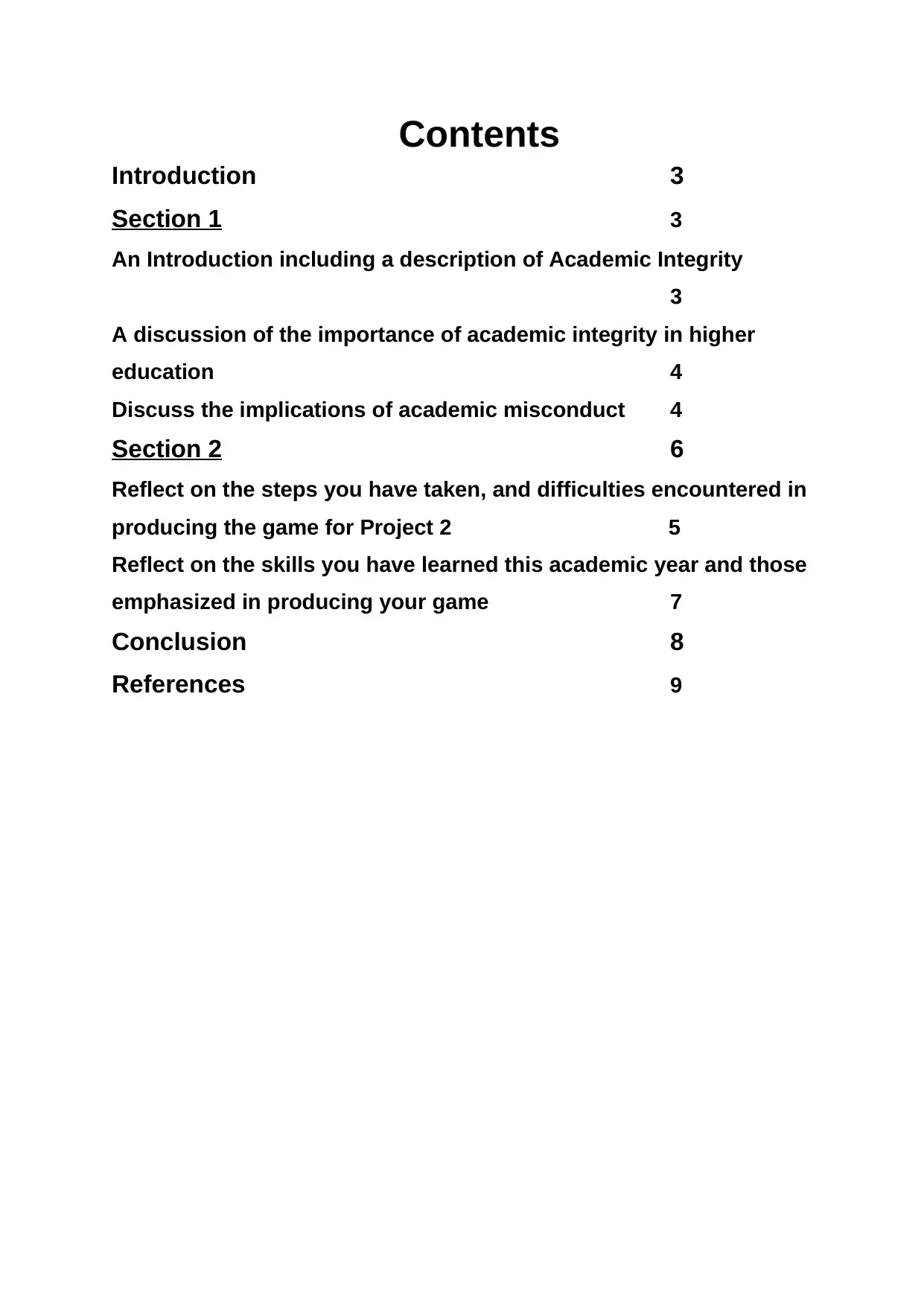
Contents
Introduction 3
Section 1 3
An Introduction including a description of Academic Integrity
3
A discussion of the importance of academic integrity in higher
education 4
Discuss the implications of academic misconduct 4
Section 2 6
Reflect on the steps you have taken, and difficulties encountered in
producing the game for Project 2 5
Reflect on the skills you have learned this academic year and those
emphasized in producing your game 7
Conclusion 8
References 9
Introduction 3
Section 1 3
An Introduction including a description of Academic Integrity
3
A discussion of the importance of academic integrity in higher
education 4
Discuss the implications of academic misconduct 4
Section 2 6
Reflect on the steps you have taken, and difficulties encountered in
producing the game for Project 2 5
Reflect on the skills you have learned this academic year and those
emphasized in producing your game 7
Conclusion 8
References 9
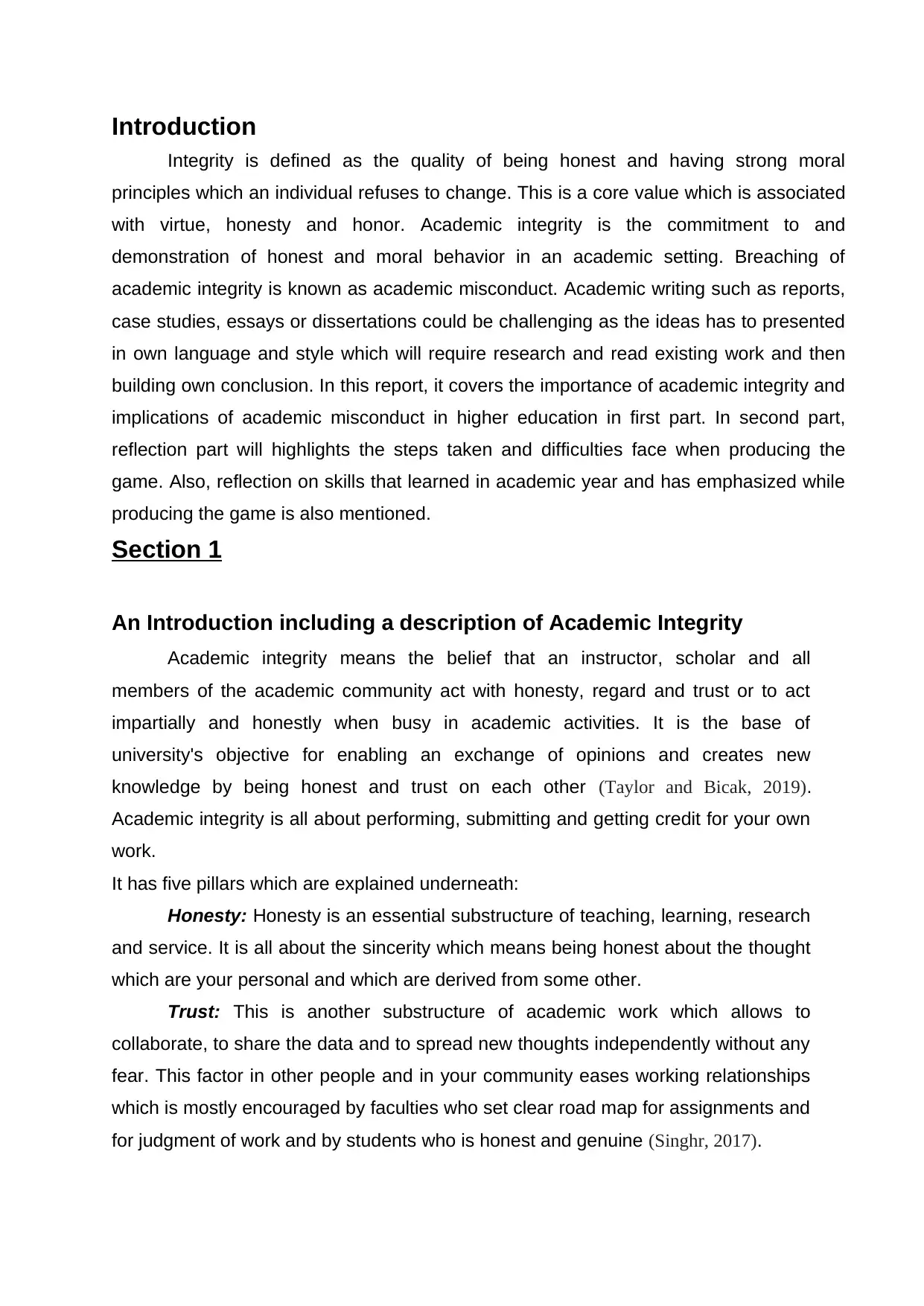
Introduction
Integrity is defined as the quality of being honest and having strong moral
principles which an individual refuses to change. This is a core value which is associated
with virtue, honesty and honor. Academic integrity is the commitment to and
demonstration of honest and moral behavior in an academic setting. Breaching of
academic integrity is known as academic misconduct. Academic writing such as reports,
case studies, essays or dissertations could be challenging as the ideas has to presented
in own language and style which will require research and read existing work and then
building own conclusion. In this report, it covers the importance of academic integrity and
implications of academic misconduct in higher education in first part. In second part,
reflection part will highlights the steps taken and difficulties face when producing the
game. Also, reflection on skills that learned in academic year and has emphasized while
producing the game is also mentioned.
Section 1
An Introduction including a description of Academic Integrity
Academic integrity means the belief that an instructor, scholar and all
members of the academic community act with honesty, regard and trust or to act
impartially and honestly when busy in academic activities. It is the base of
university's objective for enabling an exchange of opinions and creates new
knowledge by being honest and trust on each other (Taylor and Bicak, 2019).
Academic integrity is all about performing, submitting and getting credit for your own
work.
It has five pillars which are explained underneath:
Honesty: Honesty is an essential substructure of teaching, learning, research
and service. It is all about the sincerity which means being honest about the thought
which are your personal and which are derived from some other.
Trust: This is another substructure of academic work which allows to
collaborate, to share the data and to spread new thoughts independently without any
fear. This factor in other people and in your community eases working relationships
which is mostly encouraged by faculties who set clear road map for assignments and
for judgment of work and by students who is honest and genuine (Singhr, 2017).
Integrity is defined as the quality of being honest and having strong moral
principles which an individual refuses to change. This is a core value which is associated
with virtue, honesty and honor. Academic integrity is the commitment to and
demonstration of honest and moral behavior in an academic setting. Breaching of
academic integrity is known as academic misconduct. Academic writing such as reports,
case studies, essays or dissertations could be challenging as the ideas has to presented
in own language and style which will require research and read existing work and then
building own conclusion. In this report, it covers the importance of academic integrity and
implications of academic misconduct in higher education in first part. In second part,
reflection part will highlights the steps taken and difficulties face when producing the
game. Also, reflection on skills that learned in academic year and has emphasized while
producing the game is also mentioned.
Section 1
An Introduction including a description of Academic Integrity
Academic integrity means the belief that an instructor, scholar and all
members of the academic community act with honesty, regard and trust or to act
impartially and honestly when busy in academic activities. It is the base of
university's objective for enabling an exchange of opinions and creates new
knowledge by being honest and trust on each other (Taylor and Bicak, 2019).
Academic integrity is all about performing, submitting and getting credit for your own
work.
It has five pillars which are explained underneath:
Honesty: Honesty is an essential substructure of teaching, learning, research
and service. It is all about the sincerity which means being honest about the thought
which are your personal and which are derived from some other.
Trust: This is another substructure of academic work which allows to
collaborate, to share the data and to spread new thoughts independently without any
fear. This factor in other people and in your community eases working relationships
which is mostly encouraged by faculties who set clear road map for assignments and
for judgment of work and by students who is honest and genuine (Singhr, 2017).
⊘ This is a preview!⊘
Do you want full access?
Subscribe today to unlock all pages.

Trusted by 1+ million students worldwide
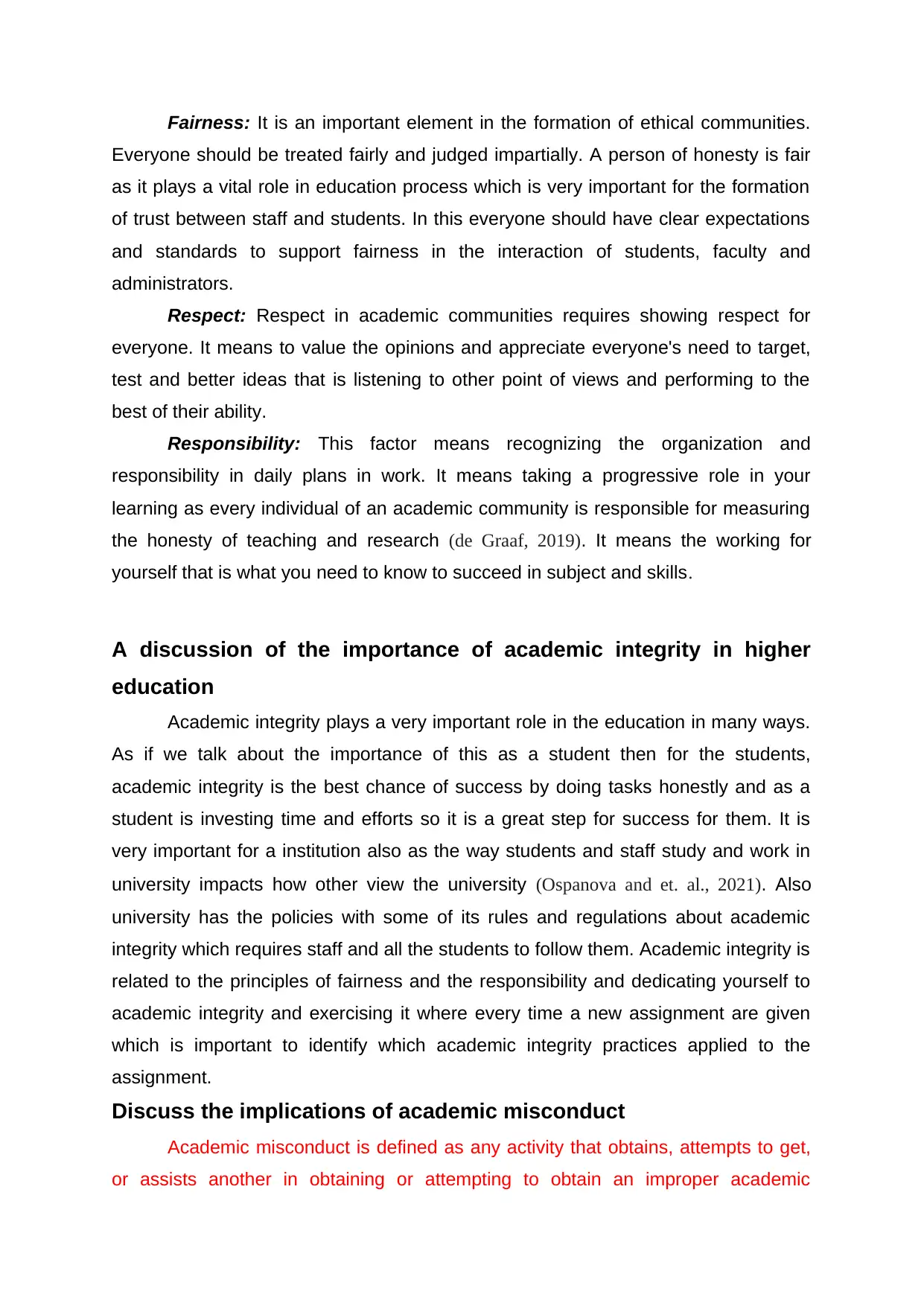
Fairness: It is an important element in the formation of ethical communities.
Everyone should be treated fairly and judged impartially. A person of honesty is fair
as it plays a vital role in education process which is very important for the formation
of trust between staff and students. In this everyone should have clear expectations
and standards to support fairness in the interaction of students, faculty and
administrators.
Respect: Respect in academic communities requires showing respect for
everyone. It means to value the opinions and appreciate everyone's need to target,
test and better ideas that is listening to other point of views and performing to the
best of their ability.
Responsibility: This factor means recognizing the organization and
responsibility in daily plans in work. It means taking a progressive role in your
learning as every individual of an academic community is responsible for measuring
the honesty of teaching and research (de Graaf, 2019). It means the working for
yourself that is what you need to know to succeed in subject and skills.
A discussion of the importance of academic integrity in higher
education
Academic integrity plays a very important role in the education in many ways.
As if we talk about the importance of this as a student then for the students,
academic integrity is the best chance of success by doing tasks honestly and as a
student is investing time and efforts so it is a great step for success for them. It is
very important for a institution also as the way students and staff study and work in
university impacts how other view the university (Ospanova and et. al., 2021). Also
university has the policies with some of its rules and regulations about academic
integrity which requires staff and all the students to follow them. Academic integrity is
related to the principles of fairness and the responsibility and dedicating yourself to
academic integrity and exercising it where every time a new assignment are given
which is important to identify which academic integrity practices applied to the
assignment.
Discuss the implications of academic misconduct
Academic misconduct is defined as any activity that obtains, attempts to get,
or assists another in obtaining or attempting to obtain an improper academic
Everyone should be treated fairly and judged impartially. A person of honesty is fair
as it plays a vital role in education process which is very important for the formation
of trust between staff and students. In this everyone should have clear expectations
and standards to support fairness in the interaction of students, faculty and
administrators.
Respect: Respect in academic communities requires showing respect for
everyone. It means to value the opinions and appreciate everyone's need to target,
test and better ideas that is listening to other point of views and performing to the
best of their ability.
Responsibility: This factor means recognizing the organization and
responsibility in daily plans in work. It means taking a progressive role in your
learning as every individual of an academic community is responsible for measuring
the honesty of teaching and research (de Graaf, 2019). It means the working for
yourself that is what you need to know to succeed in subject and skills.
A discussion of the importance of academic integrity in higher
education
Academic integrity plays a very important role in the education in many ways.
As if we talk about the importance of this as a student then for the students,
academic integrity is the best chance of success by doing tasks honestly and as a
student is investing time and efforts so it is a great step for success for them. It is
very important for a institution also as the way students and staff study and work in
university impacts how other view the university (Ospanova and et. al., 2021). Also
university has the policies with some of its rules and regulations about academic
integrity which requires staff and all the students to follow them. Academic integrity is
related to the principles of fairness and the responsibility and dedicating yourself to
academic integrity and exercising it where every time a new assignment are given
which is important to identify which academic integrity practices applied to the
assignment.
Discuss the implications of academic misconduct
Academic misconduct is defined as any activity that obtains, attempts to get,
or assists another in obtaining or attempting to obtain an improper academic
Paraphrase This Document
Need a fresh take? Get an instant paraphrase of this document with our AI Paraphraser
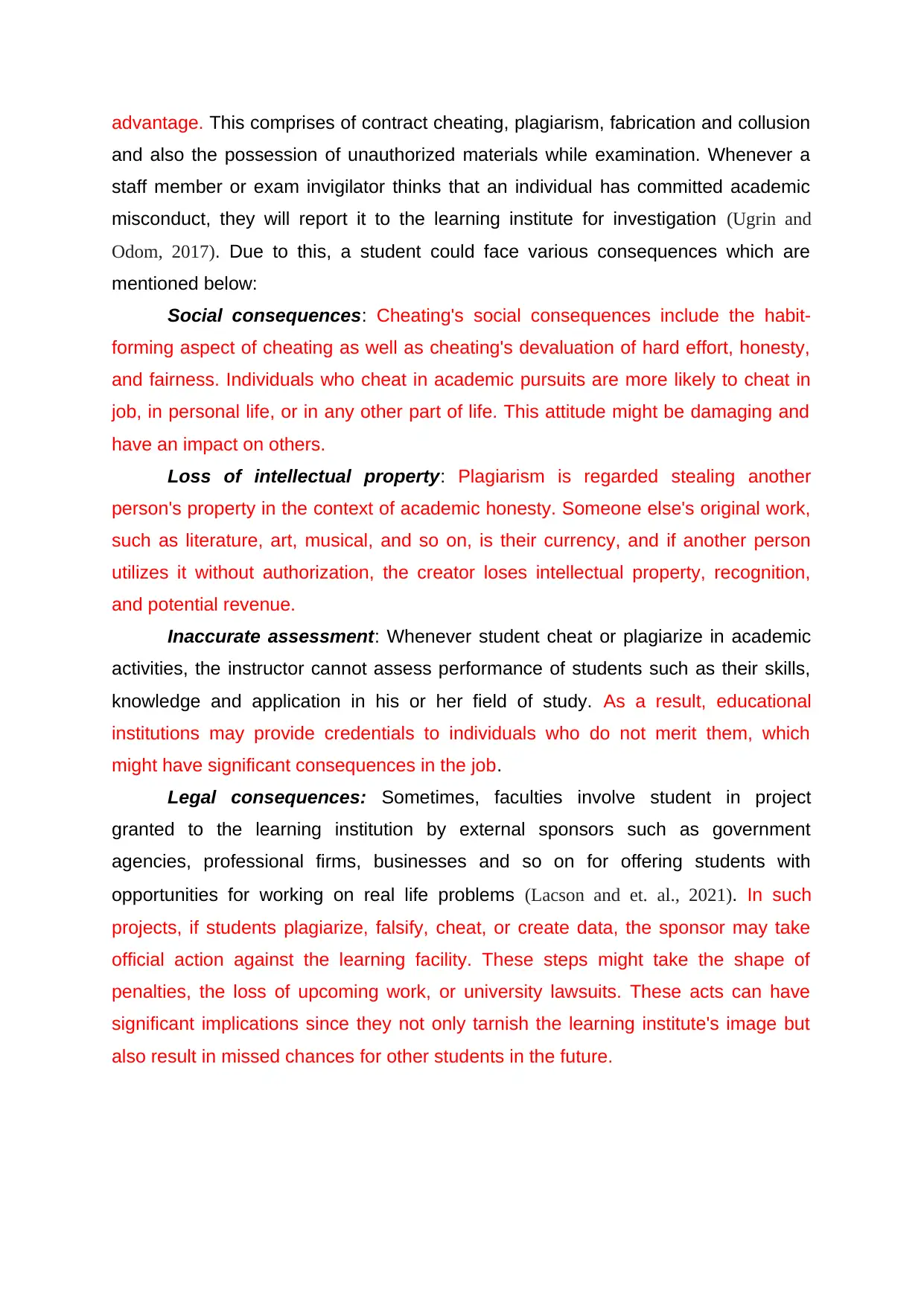
advantage. This comprises of contract cheating, plagiarism, fabrication and collusion
and also the possession of unauthorized materials while examination. Whenever a
staff member or exam invigilator thinks that an individual has committed academic
misconduct, they will report it to the learning institute for investigation (Ugrin and
Odom, 2017). Due to this, a student could face various consequences which are
mentioned below:
Social consequences: Cheating's social consequences include the habit-
forming aspect of cheating as well as cheating's devaluation of hard effort, honesty,
and fairness. Individuals who cheat in academic pursuits are more likely to cheat in
job, in personal life, or in any other part of life. This attitude might be damaging and
have an impact on others.
Loss of intellectual property: Plagiarism is regarded stealing another
person's property in the context of academic honesty. Someone else's original work,
such as literature, art, musical, and so on, is their currency, and if another person
utilizes it without authorization, the creator loses intellectual property, recognition,
and potential revenue.
Inaccurate assessment: Whenever student cheat or plagiarize in academic
activities, the instructor cannot assess performance of students such as their skills,
knowledge and application in his or her field of study. As a result, educational
institutions may provide credentials to individuals who do not merit them, which
might have significant consequences in the job.
Legal consequences: Sometimes, faculties involve student in project
granted to the learning institution by external sponsors such as government
agencies, professional firms, businesses and so on for offering students with
opportunities for working on real life problems (Lacson and et. al., 2021). In such
projects, if students plagiarize, falsify, cheat, or create data, the sponsor may take
official action against the learning facility. These steps might take the shape of
penalties, the loss of upcoming work, or university lawsuits. These acts can have
significant implications since they not only tarnish the learning institute's image but
also result in missed chances for other students in the future.
and also the possession of unauthorized materials while examination. Whenever a
staff member or exam invigilator thinks that an individual has committed academic
misconduct, they will report it to the learning institute for investigation (Ugrin and
Odom, 2017). Due to this, a student could face various consequences which are
mentioned below:
Social consequences: Cheating's social consequences include the habit-
forming aspect of cheating as well as cheating's devaluation of hard effort, honesty,
and fairness. Individuals who cheat in academic pursuits are more likely to cheat in
job, in personal life, or in any other part of life. This attitude might be damaging and
have an impact on others.
Loss of intellectual property: Plagiarism is regarded stealing another
person's property in the context of academic honesty. Someone else's original work,
such as literature, art, musical, and so on, is their currency, and if another person
utilizes it without authorization, the creator loses intellectual property, recognition,
and potential revenue.
Inaccurate assessment: Whenever student cheat or plagiarize in academic
activities, the instructor cannot assess performance of students such as their skills,
knowledge and application in his or her field of study. As a result, educational
institutions may provide credentials to individuals who do not merit them, which
might have significant consequences in the job.
Legal consequences: Sometimes, faculties involve student in project
granted to the learning institution by external sponsors such as government
agencies, professional firms, businesses and so on for offering students with
opportunities for working on real life problems (Lacson and et. al., 2021). In such
projects, if students plagiarize, falsify, cheat, or create data, the sponsor may take
official action against the learning facility. These steps might take the shape of
penalties, the loss of upcoming work, or university lawsuits. These acts can have
significant implications since they not only tarnish the learning institute's image but
also result in missed chances for other students in the future.
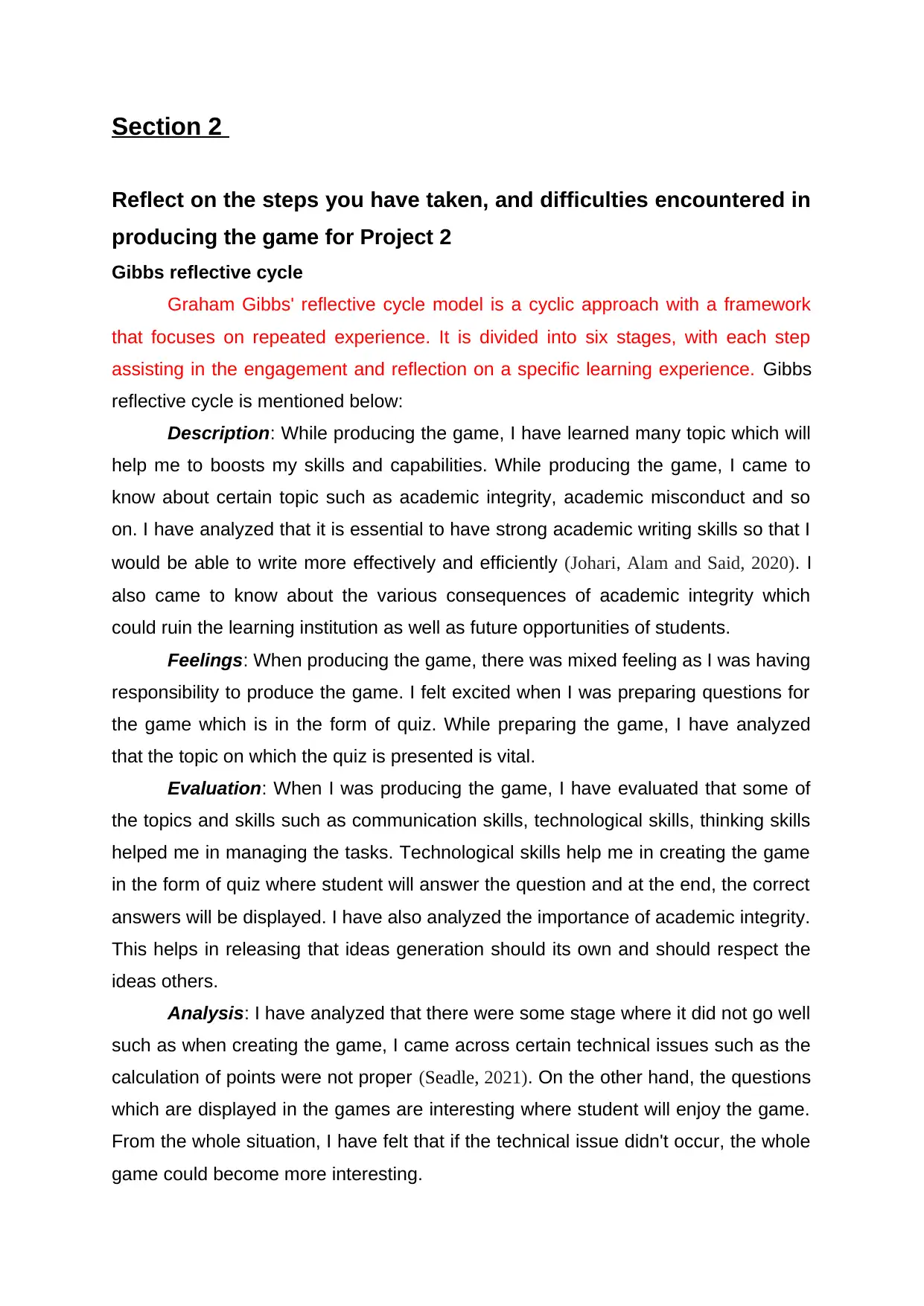
Section 2
Reflect on the steps you have taken, and difficulties encountered in
producing the game for Project 2
Gibbs reflective cycle
Graham Gibbs' reflective cycle model is a cyclic approach with a framework
that focuses on repeated experience. It is divided into six stages, with each step
assisting in the engagement and reflection on a specific learning experience. Gibbs
reflective cycle is mentioned below:
Description: While producing the game, I have learned many topic which will
help me to boosts my skills and capabilities. While producing the game, I came to
know about certain topic such as academic integrity, academic misconduct and so
on. I have analyzed that it is essential to have strong academic writing skills so that I
would be able to write more effectively and efficiently (Johari, Alam and Said, 2020). I
also came to know about the various consequences of academic integrity which
could ruin the learning institution as well as future opportunities of students.
Feelings: When producing the game, there was mixed feeling as I was having
responsibility to produce the game. I felt excited when I was preparing questions for
the game which is in the form of quiz. While preparing the game, I have analyzed
that the topic on which the quiz is presented is vital.
Evaluation: When I was producing the game, I have evaluated that some of
the topics and skills such as communication skills, technological skills, thinking skills
helped me in managing the tasks. Technological skills help me in creating the game
in the form of quiz where student will answer the question and at the end, the correct
answers will be displayed. I have also analyzed the importance of academic integrity.
This helps in releasing that ideas generation should its own and should respect the
ideas others.
Analysis: I have analyzed that there were some stage where it did not go well
such as when creating the game, I came across certain technical issues such as the
calculation of points were not proper (Seadle, 2021). On the other hand, the questions
which are displayed in the games are interesting where student will enjoy the game.
From the whole situation, I have felt that if the technical issue didn't occur, the whole
game could become more interesting.
Reflect on the steps you have taken, and difficulties encountered in
producing the game for Project 2
Gibbs reflective cycle
Graham Gibbs' reflective cycle model is a cyclic approach with a framework
that focuses on repeated experience. It is divided into six stages, with each step
assisting in the engagement and reflection on a specific learning experience. Gibbs
reflective cycle is mentioned below:
Description: While producing the game, I have learned many topic which will
help me to boosts my skills and capabilities. While producing the game, I came to
know about certain topic such as academic integrity, academic misconduct and so
on. I have analyzed that it is essential to have strong academic writing skills so that I
would be able to write more effectively and efficiently (Johari, Alam and Said, 2020). I
also came to know about the various consequences of academic integrity which
could ruin the learning institution as well as future opportunities of students.
Feelings: When producing the game, there was mixed feeling as I was having
responsibility to produce the game. I felt excited when I was preparing questions for
the game which is in the form of quiz. While preparing the game, I have analyzed
that the topic on which the quiz is presented is vital.
Evaluation: When I was producing the game, I have evaluated that some of
the topics and skills such as communication skills, technological skills, thinking skills
helped me in managing the tasks. Technological skills help me in creating the game
in the form of quiz where student will answer the question and at the end, the correct
answers will be displayed. I have also analyzed the importance of academic integrity.
This helps in releasing that ideas generation should its own and should respect the
ideas others.
Analysis: I have analyzed that there were some stage where it did not go well
such as when creating the game, I came across certain technical issues such as the
calculation of points were not proper (Seadle, 2021). On the other hand, the questions
which are displayed in the games are interesting where student will enjoy the game.
From the whole situation, I have felt that if the technical issue didn't occur, the whole
game could become more interesting.
⊘ This is a preview!⊘
Do you want full access?
Subscribe today to unlock all pages.

Trusted by 1+ million students worldwide
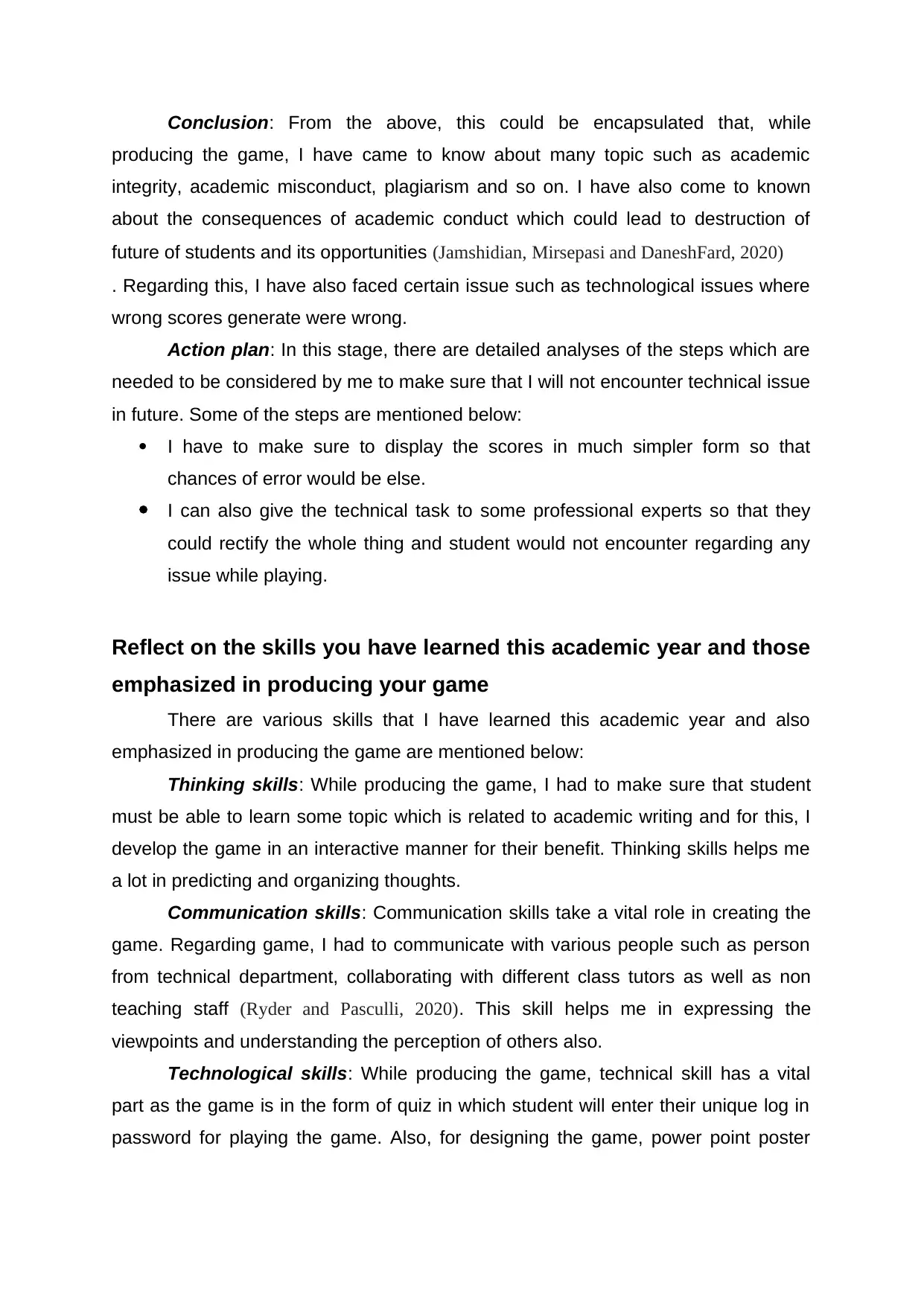
Conclusion: From the above, this could be encapsulated that, while
producing the game, I have came to know about many topic such as academic
integrity, academic misconduct, plagiarism and so on. I have also come to known
about the consequences of academic conduct which could lead to destruction of
future of students and its opportunities (Jamshidian, Mirsepasi and DaneshFard, 2020)
. Regarding this, I have also faced certain issue such as technological issues where
wrong scores generate were wrong.
Action plan: In this stage, there are detailed analyses of the steps which are
needed to be considered by me to make sure that I will not encounter technical issue
in future. Some of the steps are mentioned below:
I have to make sure to display the scores in much simpler form so that
chances of error would be else.
I can also give the technical task to some professional experts so that they
could rectify the whole thing and student would not encounter regarding any
issue while playing.
Reflect on the skills you have learned this academic year and those
emphasized in producing your game
There are various skills that I have learned this academic year and also
emphasized in producing the game are mentioned below:
Thinking skills: While producing the game, I had to make sure that student
must be able to learn some topic which is related to academic writing and for this, I
develop the game in an interactive manner for their benefit. Thinking skills helps me
a lot in predicting and organizing thoughts.
Communication skills: Communication skills take a vital role in creating the
game. Regarding game, I had to communicate with various people such as person
from technical department, collaborating with different class tutors as well as non
teaching staff (Ryder and Pasculli, 2020). This skill helps me in expressing the
viewpoints and understanding the perception of others also.
Technological skills: While producing the game, technical skill has a vital
part as the game is in the form of quiz in which student will enter their unique log in
password for playing the game. Also, for designing the game, power point poster
producing the game, I have came to know about many topic such as academic
integrity, academic misconduct, plagiarism and so on. I have also come to known
about the consequences of academic conduct which could lead to destruction of
future of students and its opportunities (Jamshidian, Mirsepasi and DaneshFard, 2020)
. Regarding this, I have also faced certain issue such as technological issues where
wrong scores generate were wrong.
Action plan: In this stage, there are detailed analyses of the steps which are
needed to be considered by me to make sure that I will not encounter technical issue
in future. Some of the steps are mentioned below:
I have to make sure to display the scores in much simpler form so that
chances of error would be else.
I can also give the technical task to some professional experts so that they
could rectify the whole thing and student would not encounter regarding any
issue while playing.
Reflect on the skills you have learned this academic year and those
emphasized in producing your game
There are various skills that I have learned this academic year and also
emphasized in producing the game are mentioned below:
Thinking skills: While producing the game, I had to make sure that student
must be able to learn some topic which is related to academic writing and for this, I
develop the game in an interactive manner for their benefit. Thinking skills helps me
a lot in predicting and organizing thoughts.
Communication skills: Communication skills take a vital role in creating the
game. Regarding game, I had to communicate with various people such as person
from technical department, collaborating with different class tutors as well as non
teaching staff (Ryder and Pasculli, 2020). This skill helps me in expressing the
viewpoints and understanding the perception of others also.
Technological skills: While producing the game, technical skill has a vital
part as the game is in the form of quiz in which student will enter their unique log in
password for playing the game. Also, for designing the game, power point poster
Paraphrase This Document
Need a fresh take? Get an instant paraphrase of this document with our AI Paraphraser
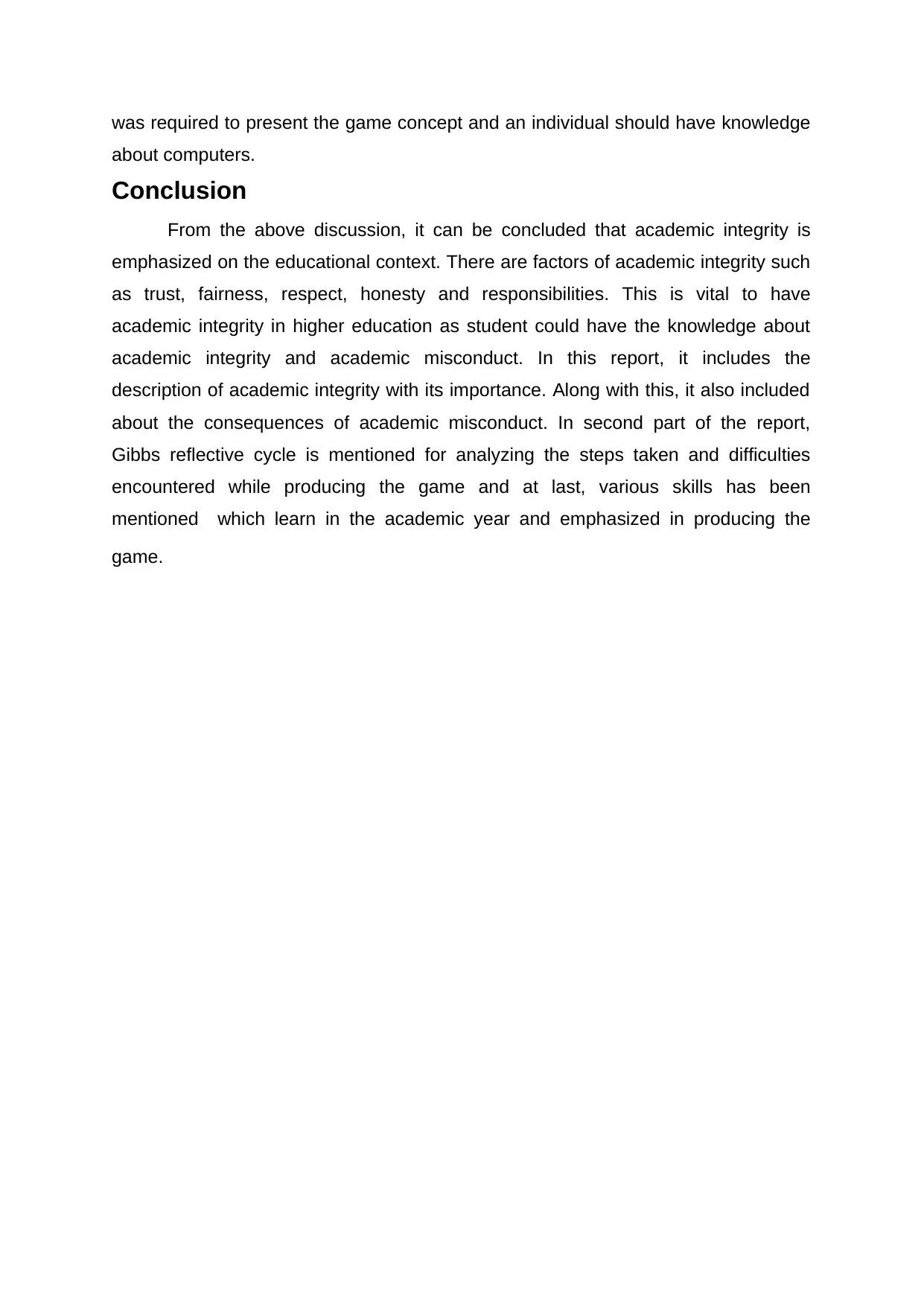
was required to present the game concept and an individual should have knowledge
about computers.
Conclusion
From the above discussion, it can be concluded that academic integrity is
emphasized on the educational context. There are factors of academic integrity such
as trust, fairness, respect, honesty and responsibilities. This is vital to have
academic integrity in higher education as student could have the knowledge about
academic integrity and academic misconduct. In this report, it includes the
description of academic integrity with its importance. Along with this, it also included
about the consequences of academic misconduct. In second part of the report,
Gibbs reflective cycle is mentioned for analyzing the steps taken and difficulties
encountered while producing the game and at last, various skills has been
mentioned which learn in the academic year and emphasized in producing the
game.
about computers.
Conclusion
From the above discussion, it can be concluded that academic integrity is
emphasized on the educational context. There are factors of academic integrity such
as trust, fairness, respect, honesty and responsibilities. This is vital to have
academic integrity in higher education as student could have the knowledge about
academic integrity and academic misconduct. In this report, it includes the
description of academic integrity with its importance. Along with this, it also included
about the consequences of academic misconduct. In second part of the report,
Gibbs reflective cycle is mentioned for analyzing the steps taken and difficulties
encountered while producing the game and at last, various skills has been
mentioned which learn in the academic year and emphasized in producing the
game.
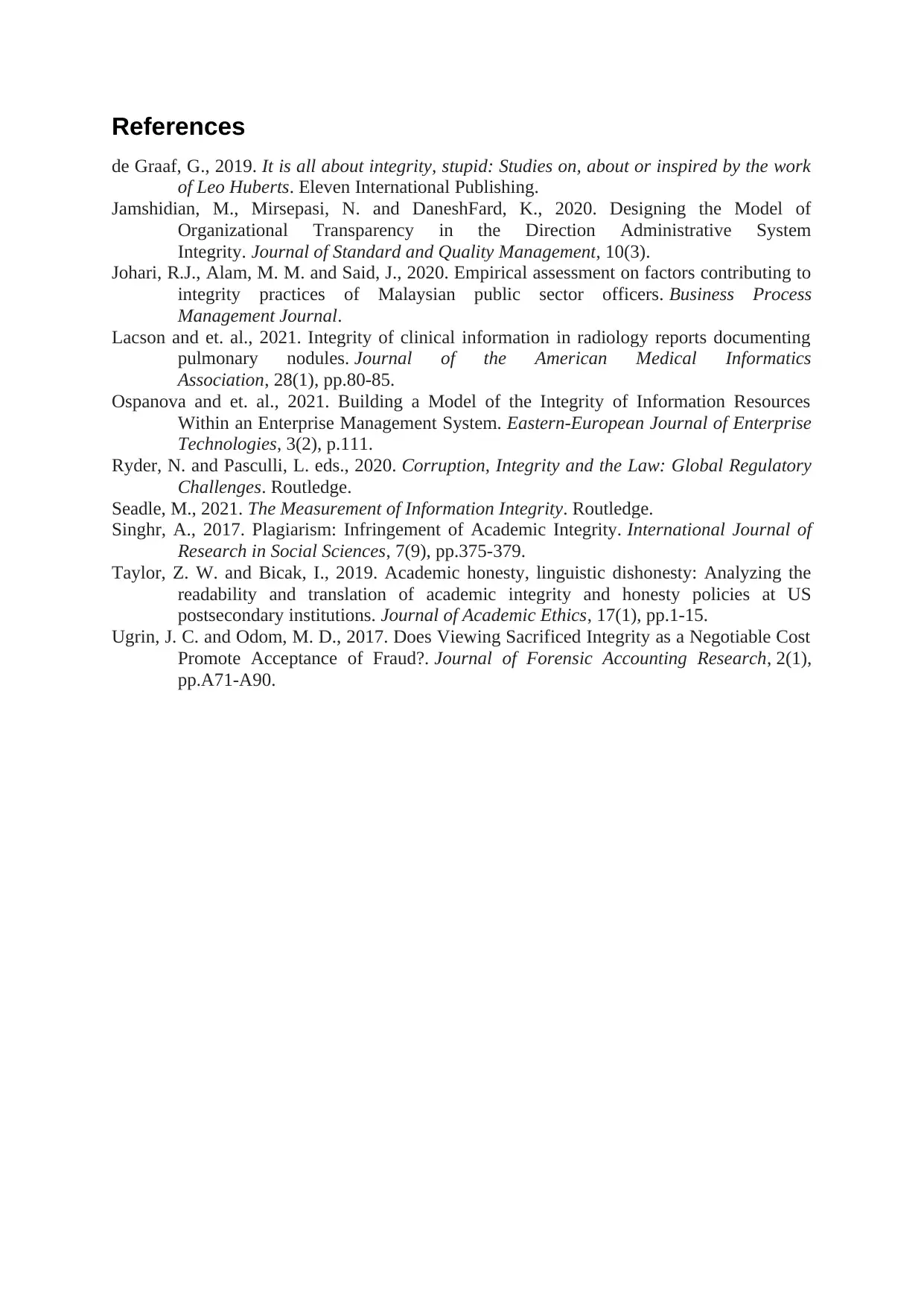
References
de Graaf, G., 2019. It is all about integrity, stupid: Studies on, about or inspired by the work
of Leo Huberts. Eleven International Publishing.
Jamshidian, M., Mirsepasi, N. and DaneshFard, K., 2020. Designing the Model of
Organizational Transparency in the Direction Administrative System
Integrity. Journal of Standard and Quality Management, 10(3).
Johari, R.J., Alam, M. M. and Said, J., 2020. Empirical assessment on factors contributing to
integrity practices of Malaysian public sector officers. Business Process
Management Journal.
Lacson and et. al., 2021. Integrity of clinical information in radiology reports documenting
pulmonary nodules. Journal of the American Medical Informatics
Association, 28(1), pp.80-85.
Ospanova and et. al., 2021. Building a Model of the Integrity of Information Resources
Within an Enterprise Management System. Eastern-European Journal of Enterprise
Technologies, 3(2), p.111.
Ryder, N. and Pasculli, L. eds., 2020. Corruption, Integrity and the Law: Global Regulatory
Challenges. Routledge.
Seadle, M., 2021. The Measurement of Information Integrity. Routledge.
Singhr, A., 2017. Plagiarism: Infringement of Academic Integrity. International Journal of
Research in Social Sciences, 7(9), pp.375-379.
Taylor, Z. W. and Bicak, I., 2019. Academic honesty, linguistic dishonesty: Analyzing the
readability and translation of academic integrity and honesty policies at US
postsecondary institutions. Journal of Academic Ethics, 17(1), pp.1-15.
Ugrin, J. C. and Odom, M. D., 2017. Does Viewing Sacrificed Integrity as a Negotiable Cost
Promote Acceptance of Fraud?. Journal of Forensic Accounting Research, 2(1),
pp.A71-A90.
de Graaf, G., 2019. It is all about integrity, stupid: Studies on, about or inspired by the work
of Leo Huberts. Eleven International Publishing.
Jamshidian, M., Mirsepasi, N. and DaneshFard, K., 2020. Designing the Model of
Organizational Transparency in the Direction Administrative System
Integrity. Journal of Standard and Quality Management, 10(3).
Johari, R.J., Alam, M. M. and Said, J., 2020. Empirical assessment on factors contributing to
integrity practices of Malaysian public sector officers. Business Process
Management Journal.
Lacson and et. al., 2021. Integrity of clinical information in radiology reports documenting
pulmonary nodules. Journal of the American Medical Informatics
Association, 28(1), pp.80-85.
Ospanova and et. al., 2021. Building a Model of the Integrity of Information Resources
Within an Enterprise Management System. Eastern-European Journal of Enterprise
Technologies, 3(2), p.111.
Ryder, N. and Pasculli, L. eds., 2020. Corruption, Integrity and the Law: Global Regulatory
Challenges. Routledge.
Seadle, M., 2021. The Measurement of Information Integrity. Routledge.
Singhr, A., 2017. Plagiarism: Infringement of Academic Integrity. International Journal of
Research in Social Sciences, 7(9), pp.375-379.
Taylor, Z. W. and Bicak, I., 2019. Academic honesty, linguistic dishonesty: Analyzing the
readability and translation of academic integrity and honesty policies at US
postsecondary institutions. Journal of Academic Ethics, 17(1), pp.1-15.
Ugrin, J. C. and Odom, M. D., 2017. Does Viewing Sacrificed Integrity as a Negotiable Cost
Promote Acceptance of Fraud?. Journal of Forensic Accounting Research, 2(1),
pp.A71-A90.
⊘ This is a preview!⊘
Do you want full access?
Subscribe today to unlock all pages.

Trusted by 1+ million students worldwide
1 out of 9
Related Documents
Your All-in-One AI-Powered Toolkit for Academic Success.
+13062052269
info@desklib.com
Available 24*7 on WhatsApp / Email
![[object Object]](/_next/static/media/star-bottom.7253800d.svg)
Unlock your academic potential
Copyright © 2020–2026 A2Z Services. All Rights Reserved. Developed and managed by ZUCOL.


